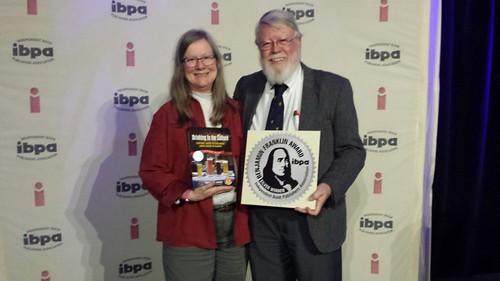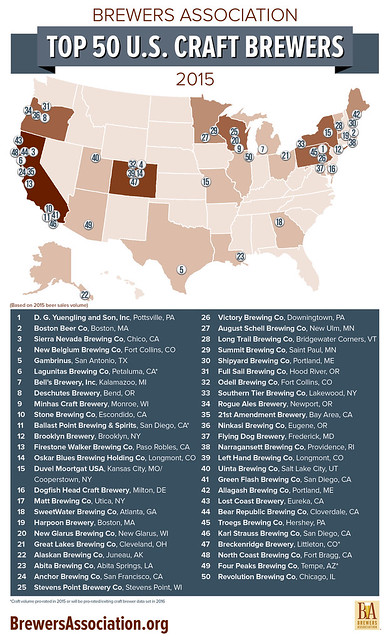
A bi-weekly, non-comprehensive roundup
of news of beer and other things.
Weeks 13/14
27 March - 9 April 2016
- 9 April 2016
The Independent Book Publishers Association has awarded a 2016 silver medal for “Best New Voice: Non-Fiction” to Drinking in the Culture: Tuppers Guide to Drinking in Europe, a beer-travel book written by Washington, D.C.-area good-beer advocates, Bob and Ellie Tupper.
—Via CultureAle Press. - 7 April 2016
So what exactly is a “session beer?” Defining them is actually trickier than is sounds. They’re not exactly a beer style or even a collection of styles, more like an idea. The basic notion is that a “session beer” is one that you can drink during an entire “session” of drinking and still be relatively lucid and hold up your end of the conversation.
—Via Jay Brooks on Session Beer Day, at Mercury News.
Lew Bryson defines them as being 4.5% or below and also includes in his definition that they must be flavorful, balanced and reasonably priced. His simplest way of describing them is “low-alcohol, but not low-taste.” [...]
My friend Martyn Cornell, who’s a British beer writer and historian, gave one of the best statements I’ve ever seen about how session beers are not just about being low-alcohol, but are “a combination of restraint, satisfaction, and ‘moreishness.’ Just like the ideal companions on a good evening down the pub, a good session beer will not dominate the occasion and demand attention; at the same time its contribution, while never obtrusive, will be welcome, satisfying, and pleasurable.” - 7 April 2016
The crony capitalists of ... (gasp) 'craft' beer.Why does growth via a private sale raise the ire of beer drinkers while growth via government subsidies gets barely any backlash?
—Via Reason.- The government of North Carolina gives
- $13 million to Colorado-based New Belgium Brewing
- and $5 million to California-based Sierra Nevada Brewing to build new facilities in Asheville.
- The government of Virginia gives $3 million to Bend, Oregon-based Deschutes Brewing to open a facility in Roanoke.
- To entice it to Richmond, the government of Virginia gives California-based Stone Brewing
- $5 million grant
- $1.5 million economic development grant
- $500,000 sustainability grant
- (and from the city government of Richmond) $31 million in bonds to build its brewery and bistro.
- The city of Berlin, GERMANY, gives Stone Brewing 2.3 million euros to open a facility in the city — if certain employment and investment goals are met. Based on today's exchange rate, that's $2 million, 615 thousand U.S. dollars.
- The government of North Carolina gives
- 6 April 2016
Merle Haggard, revered country singer of common man anthems, dies at 79.
—Via Washington Post. - 5 April 2016
Super Bowl winning quarterback, Seattle Seahawks' Russell Wilson and 6th century patron saint of brewers, St. Arnold: DNA discovers that they're family.
—Via Washington Post. - 5 April 2016
April heralds the annual Brewers Association list of largest breweries. [See below.] The most startling element of this year's tally is how many breweries have a small letter appended after the name. Those footnotes connect to a description of the compromises and deviations from the pure essence of "craft brewing" each brewery has taken. [...]
—Via Jeff Alworth, at Beervana.
Craft beer is, tautologically, beer made by craft breweries. But 2015 was the year that brewing broke "craft beer." The once-elegant dichotomy between craft and noncraft, fraying at the edges since the formation of Craft Brewers Alliance, was shattered with brewery acquisitions, mergers, sales of minority stakes, and mission creep into non-beer products. - 5 April 2016
The [U.S.] Brewers Association has released its annual lists of the top 50 U.S. brewing companies and the top 50 U.S. 'craft' breweries, based on sales volume.
—Via Brewers Association. - 5 April 2016
Villanova University wins March Madness, defeating North Carolina in the 2016 National Collegiate Athletic Assocaition (NCAA) annual basketball championship with a 3-point shot as time expired, possibly the most exciting finish in the tournament's history.
—Via Yahoo Sports. - 4 April 2016
The "Panama Papers": Vladimir Putin, the 1980s Brinks Heist, various world leaders, off-shore banks, crooks, money-launderers. Governments across the world are investigating possible financial wrongdoing by the rich and powerful after a leak of four decades of documents from a Panamanian law firm, Mossack Fonseca, that specialized in setting up offshore companies. The documents, covering a period from 1977 until December 2015, were leaked to more than 100 news organizations around the world in cooperation with the U.S.-based International Consortium of Investigative Journalists (ICIJ).
—Via New York Times. - 4 April 2016
Medal of Freedom recipient Dr. Joe Medicine Crow —historian, activist, author, the last link to the Battle of Little Big Horn, and the last Crow war chief— dies at 102.
—Via Washington Post. - 4 April 2016
The U.S. Department of Justice announces that BP will pay $20 billion in civil and federal penalties and fines resulting from its role in the Deepwater Horizon oil rig explosion that killed 11 people and devastated much of the Gulf of Mexico ecosystem in 2010. However, "75% of this fine is tax deductible for BP, meaning that US taxpayers will foot most of the bill for the largest oil spill in history."
—Via TruthOut. - 2 April 2016
Beer writer Andy Crouch on ethics in beer journalism, writing, and blogging:Some [beer] bloggers have suggested they are not bound by any ethical rules because they are just bloggers, not writers. I think the audience should be able to tell whether the writer whose work they are reading is tethered by ethical rules or is just flailing wildly at every free beer or book tossed his or her way.
—As quoted by Alan McLeod, at A Good Beer Blog.
In both journalism and the law, and other professions, the standard one is held to is not an actual conflict but the appearance of a conflict of interest. It’s not that someone is inherently biased but that their position or particular situation might create the appearance of bias - 2 April 2016
Writer James Fallows at The Atlantic agrees with beer writer Jeff Alworth: 'craft' breweries are good for cities.[Fallows] suggests that the appearance of a craft brewery is one effect of community health—but I’d argue that it’s at least in part the cause of a community’s vitality.
—Via Beervana.
Breweries are industrial operations, and they’re expensive. Beer is a mass beverage, and even making it on a brewpub scale means you have to have quite a bit of space for the brewhouse, fermentation, and storage. All that equipment costs a lot, and real estate does, too. When you’re spending a quarter- or half-million dollars on equipment, you can’t afford expensive commercial space. So breweries end up on the fringes, in bad parts of town where the rent is cheap. That alone is the first step of revitalization.
But breweries aren’t like the average industrial plant. They are people magnets, bringing folks in who are curious to try a pint of locally made IPA. In fairly short order, breweries can create little pockets of prosperity in cities that can (and often do) radiate out into the neighborhood. Pretty soon, other businesses see the bustle and consider moving in, too. It doesn’t hurt that breweries often find run-down parts of towns that have great buildings. Once a brewery moves in and refurbishes an old building, it reveals the innate promise of adjacent buildings to prospective renters. - 30 March 2016
Private equity in the 'craft' beer market could cause a second wave of upheavals within a decade.Most craft beer fans, infamous for crying sellout' and chastising brewers for any number of perceived offenses, don’t realize just how accurate they are. [...]
—Via Tara Nurin, at Forbes.
Despite what you might have believed, [private equity] investors aren’t satisfied to collect off annual profits. A traditional private-equity fund, which pools money from wealthy individual and institutional investors to take equity stakes in companies, has a finite lifespan of usually 10 years. When that fund sunsets, investors expect to get paid out. A lot.
What does this mean for the industry? Of the more than half-dozen high-profile equity deals that have taken place recently, most of the PE firms will look to exit three to five years afterward, launching a rash of the resales and public offerings that the craft community so derides. If a profitable exit doesn’t look possible, the firm may hold longer, but something has to happen by the end of the fund’s 10-year lifespan, or in some cases a few years afterward if it gets an extension from investors. - 2 April 2016
- A 'shot' with that latte? Starbucks to begin selling beer and wine at several of its Northern Virginia coffeehouses.
—Via Washington Post. - And in Washington, D.C.
—Via Washingtonian.
- A 'shot' with that latte? Starbucks to begin selling beer and wine at several of its Northern Virginia coffeehouses.
- 27 March 2016
A unanimous Supreme Court vote, 8-0, preserves the principle of 'one person, one vote.'
—Via Talking Points Memo.

The three most successful craft brewers —Dick Yuengling (Yuengling), Jim Koch (Boston Beer), Ken Grossman (Sierra Nevada)— share a stage together for the first time, at the Meeting of the Malts in Bethlehem, Pennsylvania, in March 2016. (Credit: Yvonne Appeltans)
- Clamps and Gaskets is a bi-weekly wrap-up of stories not posted at Yours For Good Fermentables.com. Most deal with beer (or wine, or whisky); some do not.
- The Clamps and Gaskets graphic was created by Mike Licht at NotionsCapital.
- For more from YFGF:
- Follow on Twitter: @Cizauskas.
- Like on Facebook: YoursForGoodFermentables.
- Follow on Flickr: Cizauskas.
- Follow on Instagram: @tcizauskas.










No comments:
Post a Comment
Comment here ...